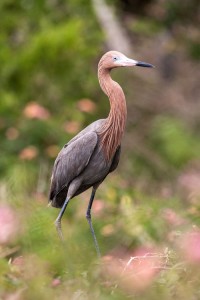Most of us are bird-watchers, whether we claim to be or not. How often have you enjoyed watching a Great Blue Heron or Great Egret fish along the shore? In the spring, have you not enjoyed seeing the warblers, orioles, hummingbirds, and Purple Martins return once again? Who doesn’t love seeing the brilliantly pink Roseate Spoonbills fly by? What about the ducks—so many wonderful ducks winter in Texas, such as Pintails, Redheads, Green-winged and Cinnamon Teals. Two of my favorites are Snow Geese and Sandhill Cranes—their sounds herald in the fall and winter. Even if you don’t know all of the names of these birds, in a moderate climate like the Texas coast, it is one of the ways that we Texans know when the seasons change.
Whether we enjoy the birds or not—birds stand guard for the rest of us (like the canary in a coal mine). The birds have taught us that our entire eco-system becomes threatened when pesticides, oil spills, pollution, uncontrolled predation, and loss of habitat and estuaries are uncontrolled.
If you love fishing, birding, shelling or other recreation in Matagorda Bay you are benefiting from restoration projects to preserve the eco-system that we all enjoy. They are funded by tax dollars, grants, and donations from non-governmental organizations as well as countless hours of work provided by volunteers. At times it is a work in progress—but one that all of us want to continue to improve. This brings me to the real topic of this article—protecting one of the “Jewels” of Port O’Connor and Matagorda Bay—Chester Island.
Chester Island is one of the largest and most successful colonial waterbird rookeries in the state—located between Port O’Connor and the Matagorda Ship Channel. Locally this island is also called Sundown Island or Bird Island. The term “colonial waterbirds” refers to birds of many species that nest together in large groups to afford greater protection from predators (like a “neighborhood watch” system).
In 1923 Audubon began leasing islands in Texas to establish a system of island sanctuaries along the Texas Coast for colonial waterbirds. One of the efforts was to repopulate the Texas coast with the Brown Pelicans and other colonial waterbirds. Coastal wardens for each of these sanctuaries were hired to protect and educate the public on their importance to our eco-system.
Chester Island started with only three pair of nesting Brown Pelicans on a dredge fill island. Since the 1970s it has become so successful that the Audubon Society has designated it as a Global IBA—an important bird area that is essential habitat for breeding, wintering, and migrating birds. In 2013 there were more than 3,000 breeding pairs of Brown Pelicans on the island. In addition there were at least 10,000 breeding pairs of other colonial waterbirds, such as herons, egrets, ibises, spoonbills, terns, gulls, and more.
What can you do to ensure that the magic of Texas coast and its birds is preserved for future generations? Here are some guidelines for Chester Island, other bird sanctuaries, and beaches with nesting birds:
How close can I fish to Chester Island?
Follow the guidelines established by the HelpGulfBirds.Org campaign: “Fish, Swim, and Play From 50 Yards Away!”
Waterbirds nest from February to August. With habitat disappearing it makes it harder for these birds to raise their families. Human disturbance can cause birds to flee or abandon their nests—leaving eggs and chicks in the nest to overheat in the sun or become victims of predators.
Some of the coastal islands, like Chester Island, are used year-round. Be sure to apply the motto “fish, swim, and play from 50 yards away” even during the fall and winter to help the ducks and other migrating birds.
Can I go on the island if there is a dock?
No. If a dock is present it was built to allow the warden, volunteers, and other government agencies access for the purpose of maintaining the island.
Can I go on the island, even if there are no signs posted?
No. Signs are posted on Chester Island—but as signs go, they get old and fall down, storms take them out, and like most of us, sometimes there are not enough funds to post new ones quickly. The fact that you see lots of birds on the island, regardless of the season, will let you know you need to stay away.
Are there any fines for going on Chester Island or other protected bird sanctuaries?
Yes. The Migratory Bird Treaty Act of 1918 protects most nesting and migratory birds. It is a federal crime to violate the Migratory Bird Act and carries a misdemeanor fine of up to $500 and/or jail up to six months. Individuals who hunt, trap, kill or attempt to sell any of these birds can be guilty of a felony with fines up to $2,000 and/or jail for up to 2 years. It is also a violation of Texas law to disturb the birds—Texas Parks and Wildlife Code 64.002 (2)(1,2,3).
In spite of current successes, birds still face multiple threats to their survival—increased ship traffic and oil spills, pollution, drowning or starvation from entanglement in fishing gear, depletion of fish by commercial fisheries, predators like fire ants, raccoons, human disturbance, and last but not least—the loss of habitat. Compared to 100 years ago nearly 50 percent of the wetlands have disappeared and in Texas have been replaced by beach houses or chemical refineries. Many species of birds as well as other wildlife are depressed because of this significant habitat loss.
If you can—get involved. Become a volunteer or donate to any of your local sanctuaries. Visit Texas Audubon for more information: tx.audubon.org. You may also, contact Chester Island’s warden, Tim Wilkinson, by email at twsword1@gmail.com. View the Chester Island website at www.chesterisland.org or view photos of the birds at chesterisland.smugmug.com. And remember—Fish, Swim, and Play from 50 Yards Away!

